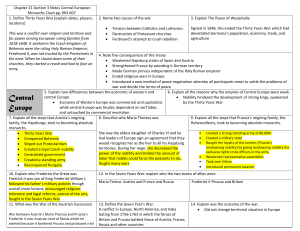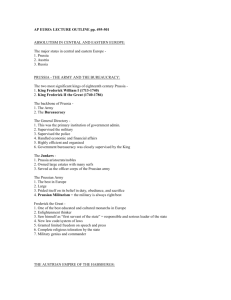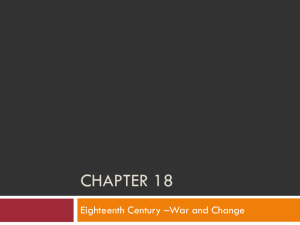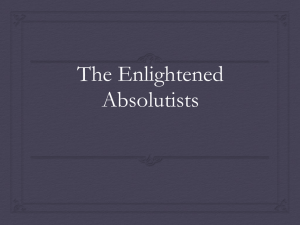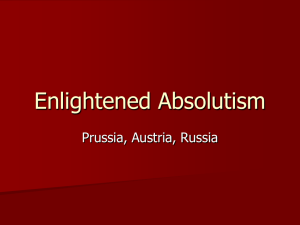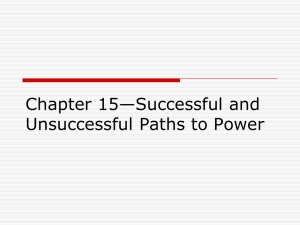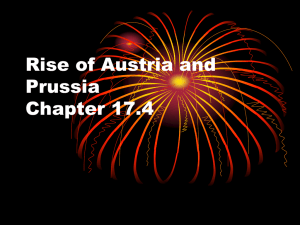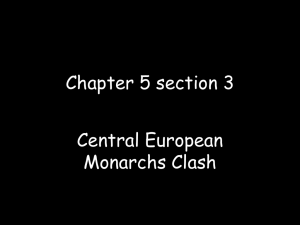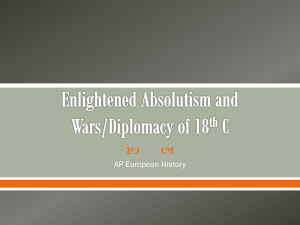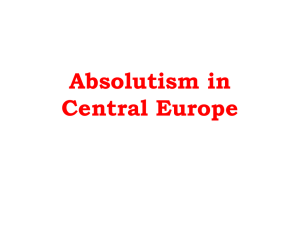Age of Absolutism – Austria, Prussia, and Russia
advertisement
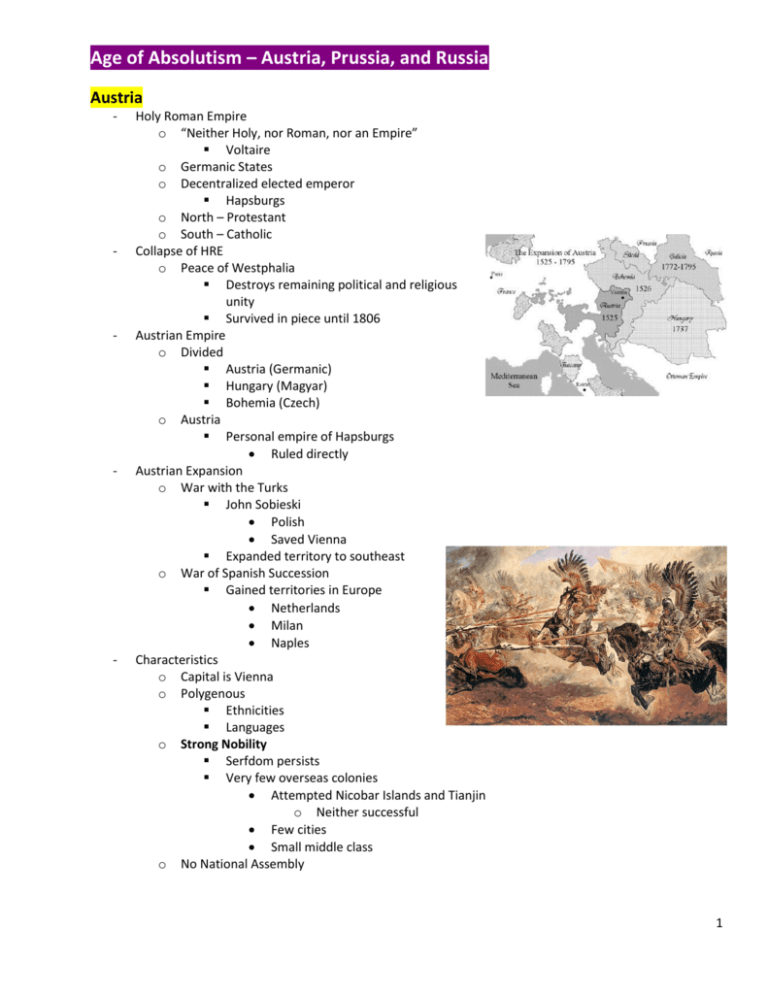
Age of Absolutism – Austria, Prussia, and Russia Austria - - - - - Holy Roman Empire o “Neither Holy, nor Roman, nor an Empire” Voltaire o Germanic States o Decentralized elected emperor Hapsburgs o North – Protestant o South – Catholic Collapse of HRE o Peace of Westphalia Destroys remaining political and religious unity Survived in piece until 1806 Austrian Empire o Divided Austria (Germanic) Hungary (Magyar) Bohemia (Czech) o Austria Personal empire of Hapsburgs Ruled directly Austrian Expansion o War with the Turks John Sobieski Polish Saved Vienna Expanded territory to southeast o War of Spanish Succession Gained territories in Europe Netherlands Milan Naples Characteristics o Capital is Vienna o Polygenous Ethnicities Languages o Strong Nobility Serfdom persists Very few overseas colonies Attempted Nicobar Islands and Tianjin o Neither successful Few cities Small middle class o No National Assembly 1 - - Weaknesses o Small army o Not Unified o Nobility Prevented much change o Ethnicities Hostility from Bohemia and Hungary o Loss of Spanish Empire War of Spanish Succession Spanish possessions fall under Bourbon authority Pragmatic Sanction o 1713 o Made following death of Charles VI Maria Theresa ONLY heir to Austrian Throne Forced other empires to accept Caveat – They are not allowed to invade Prussia - - - - Background o Territory Located in north Germany No true borders Very disjointed o Existed as elector state since 1529 o 1618 Electorate of Brandenburg (German) and Duchy of Prussia (Polish Germanic) Brandenburg freed up after 30 years War Prussia freed up after Second Northern War Hohenzollern o Hereditary o Absolutists o Highly centralized Very bureaucratic Army o Very Strong o Grew up around army Economy o Centered on growing army No taxes, Loyalty Demand drove economy to army, full o Poor agriculturally power Social Groups Paid taxes, some o Junkers political power Aristocracy No taxes, no Land lords power Did not want to lose power Supported Hohenzollerns as long as no taxes Complete power over peasants o Middle Class Growing o Peasants Sinking deeper into serfdom 2 Nobility of Europe Austria - England France - - Religion o Protestant o Tolerant Especially with scholars and artists Kings of Prussia o Frederick William the Great Elector One of the electors of HRE Created Prussian State Made powerful by building up army o King Frederick I Continued to build up state Otherwise did not really do much o King Frederick William Lived modestly Did not spend much Built up military Always wore military uniform Potsdam Giants Set up draft and reserve guard Cruel to son o Frederick William II Frederick the Great Enlightenment Monarch Russia - - Background o Very late to modernize Horribly Medieval Under control of Golden Horde Ivan the Terrible r. 1547-1584 First “Tsar” of Russia Mikhail Romanov r. 1613-1645 Established Romanov Dynasty o Existed until 20th century Peter The Great o Social Reforms 1st book of etiquette Mandatory education for sons of landowners Sent Russians abroad to study Simplified alphabet Edited the 1st Russian newspaper Reformed Calendar Decreed Westernization No Beards Women dressed western Courts speak French 3 o - - - Military Reforms Professional army Reduced powers of Boyars in army Uniforms Reorganized ranks Built navy o Economic Reforms Mercantilist Increased exports Trading fleet Encouraged mining, metallurgy, textiles Recruited experts from Europe Increased taxes Depends on peasant labor Serfs suffer Moved capital St. Petersburg o Built by serfs o Warm water seaport “Window to the west” Administrative Reforms o Autocratic Established bureaucracy o No Individual rights o Duma and Council of Boyars disbanded o Establish Senate Controlled by Peter o State service required of all landowners/boyars Religious Reforms o Got rid of old believers o Appointed the Procurator of the Holy Synod Head of Church Selected by Tsar Could be gotten rid of at any time Peter indirectly in head of Church Foreign Policy o At war all but 2 years o Grand Embassy Peter trying to gain support for war vs Ottomans Brandenburg, Netherlands, England, Austria o Expanded borders To the south against Ottomans Great Northern War Versus Sweden o Charles XII Battle of Poltava o Defeat of Swedes Marked start of decline o Peter gains access to Baltic 4
